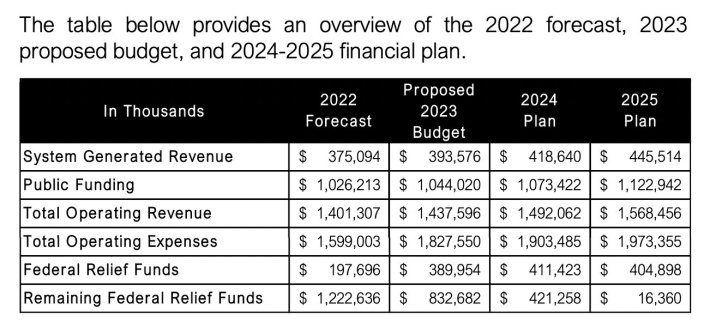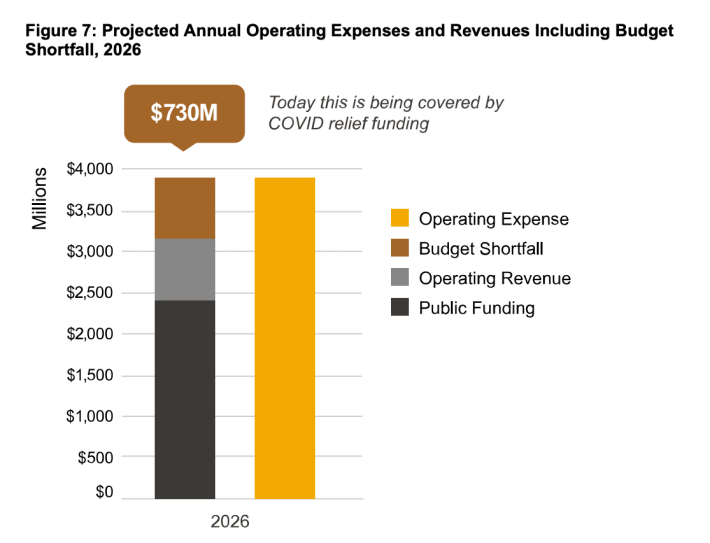Call Chicago mayor Lori Lightfoot the Pollyanna of public transportation.
During today's candidate forum put on by Fox 32 Chicago and The Lincoln Forum, Lightfoot had an awfully rose-colored view of the Chicago Transit Authority's financial prospects. Asked about the best strategy to address with the budget crisis the agency will face when federal relief funds run out, the mayor insisted that fiduciary chasm simply doesn't exist.
“Well, the fact of the matter is, there’s not going to be a fiscal cliff for the CTA because the CTA — understanding that this infusion of federal dollars is short-term — has budgeted in the out years to make sure that there are sufficient funds," she claimed, according to a Chicago Tribune report on the debate. "But let’s be honest, public transportation, mass transportation all across our country for years, has been underfunded."
She was right about that last part of course. At all levels of government, transit is woefully under-resourced compared to projects and programs that encourage driving. And Lightfoot's an expert on that subject: While her Chicago Moves program earmarked $5 million to give away free prepaid transit cars to Chicagoans, the initiative spent $7.5 million on free prepaid gasoline cards.
But her claim that the CTA is not facing a pecuniary precipice doesn't even jibe with the info that the agency, which she controls, has put out. As Streetsblog writer Igor Studenkov noted, the agency's 2023 budget document included the chart below. It shows the system is relying on hundreds of millions of dollars in federal relief funds a year to plug its budget holes, and they're not projecting a major increase in revenue in the coming years. But the CTA projects there will only be about $16 million left in 2026, so unless more federal aid is passed, there will be a nearly $400 million shortfall that year.

In December, the Regional Transit Authority, which oversees CTA, Metra, and Pace funding, published a report called "Transit Is the Answer," which warned that if ridership stays at current levels, by 2026 the regional transit system could see a $730M budget shortfall. "At nearly 20 percent of the annual expense budget, this gap will prohibit any additional improvements to the regional system."

Igor noted that the Chicago Civil Federation, a nonpartisan think tank, also warned last month that Chicago transit is hurtling towards a cash crag. "The CTA has only been able to balance its budget since FY2020 with the assistance of federal relief funding," the federation wrote. "This funding has been critical in compensating for declines in passenger revenues due to the CTA’s significant ridership losses during the COVID 19 pandemic. This will continue to be the case until FY2025... Federal funds will be nearly exhausted after 2025, posing major challenges for the fiscal future of the CTA."
"Either Lightfoot knows something the CTA doesn't, or she's wrong here," Igor concluded.
Lightfoot's challengers predictably savaged her reality-challenged optimism. "There is a fiscal cliff," Vallas said, according to the Tribune. "Right now, the farebox is 18 percent of the operating costs, that’s down from 46 percent." The former Chicago Public Schools chief apparently got that stat, which refers to 2021 farebox revenue from an anti-transit op-ed on the conservative website Wirepoints. That article argued that "CTA must... cut service to better match revenues," that is, initiate a transit death spiral of ever-worsening service, ridership, and revenue.
At today's debate Vallas argued that the solution to boosting ridership is more policing of the transit system to make customers feel safer. That's despite the fact that a few years ago a cop recklessly fired up the escalator of the busy Grand Red Line station at an unarmed man, seriously injuring him and needlessly endangering bystanders.
State rep Kam Buckner argued that a better solution is to fix a CTA funding problem that has existed long before COVID. By state law, the agency is required to to cover half of its operations expenses through fares, advertising, and other revenue streams. (The requirement was temporarily lifted during the pandemic.) Systems in New York State and California have significantly lower requirements than the RTA. Buckner noted that if Illinois changed that rule and allowed for more public funding of transit, it would help level the playing field. "This is a manmade crisis,” Buckner said, according to the Tribune.
One thing's for sure: Lightfoot isn't going to help make the CTA's funding picture any rosier until she acknowledges that there is a problem. Denial isn't just a river in Egypt, or even Cairo, Illinois.

Did you appreciate this article? Please consider making a tax-deductible donation to help fund Streetsblog Chicago's next year of publication. Thanks!




